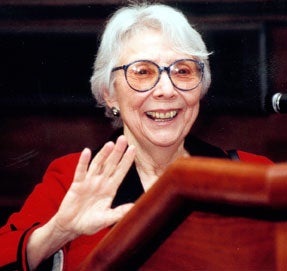by , Professor Emerita, Department of Sociology Former Director, Center for the Study of Women in Society Reprinted from Center for the Study of Women in Society: Ten Years—1983-1993
 Joan Acker
Joan Acker
Three memorable moments mark the history of the Center for the Study of Women in Society for me. The first was the founding of the research center that later became CSWS. The Center for the Sociological Study of Women, as it was called, had its beginnings in the early 1970s when the campus women's movements were exploding with new ideas and unprecedented actions. On the University of Oregon campus, we held a two-week feminist conference called Women on the Move. We campaigned for an affirmative action office, we started courses on women, and we began a research center. Our first project was a study of the status of women at the University of Oregon. We did a lot in a few years, and it was all fun.
The second great moment was our meeting in 1975 with William Harris who was to become our benefactor, making possible the metamorphosis of the small, struggling center into the much larger CSWS. Marilyn Farwell, Miriam Johnson, Richard Hill (then head of the Department of Sociology), and I met with Harris at the home of Robert Clark, the university president. Harris wanted to give his money for research and teaching about women because his late wife, Jane Grant, had been a life-long feminist and this is what she had wanted. We were one of only two research centers on women in the country at that time—still we were stunned by our good fortune, and our fantasies about the future were compelling and grandiose.
The third marvelous moment was in 1983, as we marked the beginning of the new center. Harris had died in 1981, and our inheritance had been secured against the protests of a reluctant trustee of the estate, who was suspicious of feminists in the provincial west. CSWS was ready to function, and we celebrated with a stupendous party that included a keynote speech by Jessie Bernard. Everyone we invited came, filling the Erb Memorial Union. CSWS had great plans, with the largest endowment of any center in the United States and a growing number of feminist scholars at the University of Oregon. Over the last ten years, CSWS has been pivotal in providing financial support for feminist research. I look forward to the next ten years in the hope that CSWS will contribute to solutions to the still tremendous problems facing women and that the center will be a part of radical change at the University of Oregon, not just a respectable member of the establishment.

